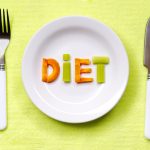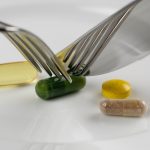 Heart problems require special attention to nutrition. At the same time, some products should be limited, and some should be introduced into a constant diet. One of the main reasons for the wide spread of heart and vascular diseases are the benefits of civilization. Mankind began to live more peacefully. A sedentary lifestyle and an abundance of oily, refined food leads to obesity and problems with blood vessels. Therefore, the prevention and treatment of cardiovascular diseases are closely related to the correction of lifestyle and control over the diet.
Heart problems require special attention to nutrition. At the same time, some products should be limited, and some should be introduced into a constant diet. One of the main reasons for the wide spread of heart and vascular diseases are the benefits of civilization. Mankind began to live more peacefully. A sedentary lifestyle and an abundance of oily, refined food leads to obesity and problems with blood vessels. Therefore, the prevention and treatment of cardiovascular diseases are closely related to the correction of lifestyle and control over the diet.
Contents
- Rule number 1. Eliminate saturated fats
- Rule number 2: Use an unrefined vegetable oil
- Rule number 3: Include grains and cereals in your daily ration
- Rule number 4: Eat fish regularly
- Rule number 5: Eat more vegetables and fruits
- Rule number 6: Control the consumption of food and beverages containing caffeine
- Rule number 7: Decrease the content of salt
- Rule number 8: Eat more foods rich in potassium
- Rule number 9: Follow recommendations organizing your daily diet
- Video
Rule number 1. Eliminate saturated fats
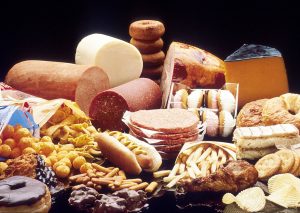 Now saturated fats are considered one of the most important risk factors in the occurrence of atherosclerosis and ischemic heart disease (CHD), as they increase the level of cholesterol in the blood and affect the coagulability of the blood, provoking thrombosis.
Now saturated fats are considered one of the most important risk factors in the occurrence of atherosclerosis and ischemic heart disease (CHD), as they increase the level of cholesterol in the blood and affect the coagulability of the blood, provoking thrombosis.
Therefore, it is necessary to sharply restrict products with saturated fatty acids:
- fatty meat (lean meat),
- meat products (sausages),
- milk and dairy products,
- hydrogenated fats (cooking fat, solid margarine, hydrofat, etc.),
- coconut and palm oil.
Many people, probably, will be surprised that milk is also in the list. But this is true – there are a lot of saturated fats in it, and even more than in meat and poultry. But such products as sour cream, butter and cheese can be eaten, but on condition that these foods are eaten with minimal fat content.
Important: Even more saturated fatty acids than in milk are found in sausage products.
Rule number 2: Use an unrefined vegetable oil
 Vegetable oils contain polyunsaturated fatty acids (PUFA) – the indispensable components of the structure of cell membranes.
Vegetable oils contain polyunsaturated fatty acids (PUFA) – the indispensable components of the structure of cell membranes.
Adequate intake of these fatty acids is necessary for:
- to regulate the blood cholesterol level,
- to reduce the susceptibility of vessels to atherosclerosis,
- to improve the rheological properties of blood (prevention of blood clots),
- to provide the normal functioning of the conduction system of the heart.
PUFA is one of the most valuable nutrient substrates for the heart. Among vegetable oils, it is recommended to choose unrefined. Add oil to fresh vegetables, for example, using as a salad dressing. Remember that in the world there are not only sunflower, but also other types of vegetable oils. They differ in the different ratio of fatty acids contained in them. Optimum for the diet will be to use several varieties: olive, pumpkin, corn, mustard, linseed oil, etc.
Important: The dose of vegetable oils should be 2-3 tablespoons a day, it is not necessary to consume too much as it is a fatty and very high-calorie product.
Rule number 3: Include grains and cereals in your daily ration
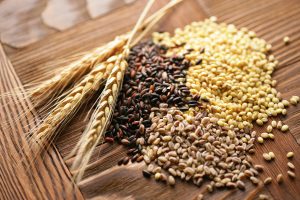
Health food for the prevention of cardiovascular diseases should include whole grains and cereals, as well as sprouted grains. Like fruit and vegetables, they contain vitamins and minerals, as well as fibers. As an additional source of fiber for problems with digestion (constipation), you can use bran.
It is desirable that the diet include porridge and dishes made of cereals:
- they are slowly digestible carbohydrates,
- create a prolonged saturation,
- do not allow a person to overeat.
Important: Cereals, cereal sprouts and bran should be added to soups, salads and other dishes.
Rule number 4: Eat fish regularly
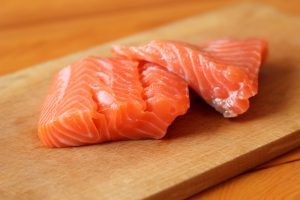 According to a recent study made by scientists at Harvard University, eating fish reduces the risk of arrhythmias and complications several times. It concerns any age groups, including people over 65, both healthy and suffering from cardiac diseases.
According to a recent study made by scientists at Harvard University, eating fish reduces the risk of arrhythmias and complications several times. It concerns any age groups, including people over 65, both healthy and suffering from cardiac diseases.
For preventive purposes, it is recommended to eat 180 grams of fish twice a week, and if there are problems with the heart, then more often – up to 5-6 times, quite a small portion. This is the only animal product which fat is good for the heart. In fish oil, there are omega-unsaturated fatty acids, which in their effect on the cardiovascular system give about the same effects as the consumption of vegetable oils.
If there are any cardiovascular diseases, patients are prescribed a diet with the obligatory presence of fish. It is supposed to be consumed at least 2 times a week.
In addition, it is desirable that it was northern, fatty varieties:
- herring,
- salmon,
- trout.
Important: The greatest amount of nutrients is found under the skin, so fish should be eaten with the skin.
Rule number 5: Eat more vegetables and fruits
 Vegetables, fruit as well as herbs contain vitamins, mineral compounds, and various micronutrients that are very important for active and correct metabolism. In turn, adequate metabolism contributes to the improvement of blood vessels, liver and other organs.
Vegetables, fruit as well as herbs contain vitamins, mineral compounds, and various micronutrients that are very important for active and correct metabolism. In turn, adequate metabolism contributes to the improvement of blood vessels, liver and other organs.
- It slows down the process of development of atherosclerosis and its consequences – heart disease.
- In addition, fresh vegetable food is a source of dietary fiber needed to remove excess cholesterol from the intestine.
It is recommended to plan your ration so that every day you get about 400-500 g of plant food in fresh and / or cooked form.
Important: As for fruit juices it is necessary to be more careful: in some of them, for example, in grape or pear juice, there are too many carbohydrates, and this is harmful for the cardiovascular system.
Rule number 6: Control the consumption of food and beverages containing caffeine
 Coffee, strong tea, energy drinks, chocolate, cocoa – all this contains caffeine. It has the ability to induce vasospasm and accelerate the number of heartbeats. As a result, this may lead to increased blood pressure and stress on the heart.
Coffee, strong tea, energy drinks, chocolate, cocoa – all this contains caffeine. It has the ability to induce vasospasm and accelerate the number of heartbeats. As a result, this may lead to increased blood pressure and stress on the heart.
The listed effects can damage the health of a person suffering from:
- arterial hypertension,
- angina pectoris,
- chronic heart failure,
- and many arrhythmias.
Therefore, some cardiac patients (not all) are advised to avoid food and beverages with caffeine.
At the same time, according to a number of studies, drinking tea (both black and green) and coffee in moderate amounts reduces the likelihood of developing atherosclerosis. This is associated with the content of flavonoids in these beverages.
Important: In general, one can say only one thing: it is not so much caffeine itself that is harmful to the heart, as its excess.
Rule number 7: Decrease the content of salt
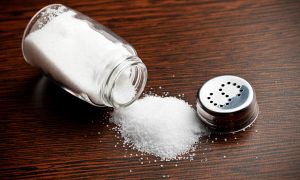 Diet for people suffering from diseases of the heart and blood vessels includes the item on restriction of table salt; especially it is important in the diet of hypertensive patients and patients with chronic heart failure.
Diet for people suffering from diseases of the heart and blood vessels includes the item on restriction of table salt; especially it is important in the diet of hypertensive patients and patients with chronic heart failure.
However, hypertension is almost mandatory “accompaniment” of other diseases of the cardiovascular system, so most patients with their presence need to comply with this recommendation.
- Salt contains sodium and delays water in the body, which causes an increase in blood pressure.
- Salt has the property of fluid retention in the body, which in its turn, can also provoke swelling that hampers the normal functioning of the heart.
Important: Cardiac patients are recommended to limit the intake of salt: up to 5 grams per day for arterial hypertension and up to 3 grams for chronic heart failure.
Rule number 8: Eat more foods rich in potassium
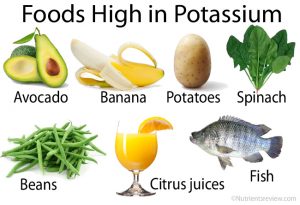 In medicine, the potassium diet for the heart has proved itself very well. The essence of this diet is that potassium is a regulator of cardiac contractions in the body. Its chronic deficiency can even lead to cardiac arrest. The nature of this phenomenon is quite simple. Thus, the heart muscle – the myocardium, like other muscles of our body, can swell, under the influence of a lack of potassium and an excess of sodium (it is a potassium antagonist substance), fluid retention begins in the body, which causes the cell swelling. The heart suffers from this and first of all reacts with the symptom of arrhythmia, and in neglected cases – heart failure. To exclude such an outcome of events, you just need to consume enough potassium.
In medicine, the potassium diet for the heart has proved itself very well. The essence of this diet is that potassium is a regulator of cardiac contractions in the body. Its chronic deficiency can even lead to cardiac arrest. The nature of this phenomenon is quite simple. Thus, the heart muscle – the myocardium, like other muscles of our body, can swell, under the influence of a lack of potassium and an excess of sodium (it is a potassium antagonist substance), fluid retention begins in the body, which causes the cell swelling. The heart suffers from this and first of all reacts with the symptom of arrhythmia, and in neglected cases – heart failure. To exclude such an outcome of events, you just need to consume enough potassium.
Products in which it is present in large quantities:
- Cabbage;
- Bananas;
- Nuts;
- Buckwheat,
- wheat,
- oatmeal;
- Potatoes;
- Dried fruits.
Important: If a lack of potassium is found in the body, it can be replenished with a potassium diet, which is made to strengthen the health of the heart muscle.
Back
Rule number 9: Follow recommendations organizing your daily diet
 Sure that diet can be chosen individually for everyone. Nevertheless, there are general recommendations:
Sure that diet can be chosen individually for everyone. Nevertheless, there are general recommendations:
- For breakfast, the most correct foods are complex carbohydrates (cereals, cereal bread, pasta from durum wheat), and even those who want to lose weight.
- In the evening it is better not to eat the above mentioned foods.
- For cardiac patients, it is very important to consume at least two fruits a day, at least 200-250 g of vegetables in any form.
- It is very important that the body receives a complete and easily digestible protein from fish, poultry, cottage cheese, to a lesser extent – from meat products.
- It is necessary to monitor the diet – meals should be in divided and moderate portions.
- It is recommended to organize three main meals (breakfast, lunch and dinner), as well as two light snacks, such as fruit.
- At night, it is advisable to drink a glass of kefir – it will have a mild choleretic effect and accelerate the excretion of cholesterol from the body (cholesterol excreted with bile).
- A tablespoon of vegetable unrefined sunflower or olive oil per day is mandatory. This refers to the entire amount of oil that you use in food, including oil, added during cooking.
- In the absence of obvious contraindications, it is possible to drink a little red wine – up to 70 ml per day, but smoking is a real enemy of the heart.
- Preference should be given to fruits and vegetables, in which there is a lot of vitamin C, P, B, as well as magnesium and potassium.
- The energy value of products per day should not exceed 2400-2600 kcal. Reducing caloric content is produced by reducing the amount of fat and a small amount of carbohydrates.
Important: In some cases, it is possible to recommend to follow the vegetarianism, but on condition that this diet is appointed by a dietician and will be competently balanced from the point of view of the provision of amino acid composition.


